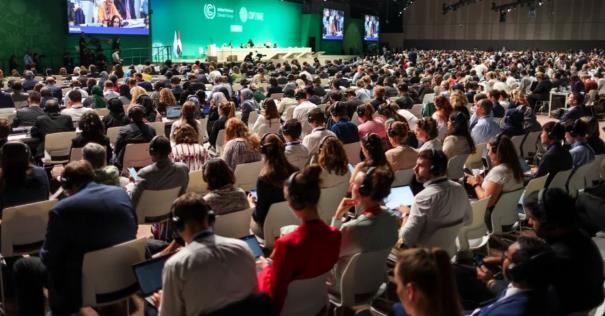
A just and inclusive energy transition that leaves no one behind presents the opportunity to address inequalities in socio-economic development. While the agreement made at COP28 to triple renewables capacity by 2030 is a global goal, countries’ capabilities and paces to reach it show persistent patterns of geographic disparities.
The International Renewable Energy Agency (IRENA) identifies heightened international collaboration and finance as the enablers that significantly improve renewables deployment efforts in regions and countries that gain the least benefits from the transition. The scale-up of renewables requires strong international collaboration and co-ordinated actions across public and private sectors targeting sustainability governance, energy and climate finance, as well as technology and innovation barriers.
The various forms of international collaborations – monetary support, technology transfer, technical assistance, and capacity building – can be implemented through the following urgent actions recommended by IRENA:
- Reform multilateral finance mechanisms and increase the flow of international public funds and low-cost finance.
- Prioritise fair and equitable development in the Global South; support policies for industrialisation and local value creation.
- Support the development of institutional and human capacity through sharing knowledge and experience.
Most public investments in renewables are made from national sources with relatively little international collaboration. IRENA finds that international collaboration plays an important role in boosting financial flows that provide lasting distributional impacts and reduce inequalities. With the limited public funds available in the developing world, mobilising public and private funds from the Global North to the Global South through international collaboration such as development aid or multilateral development banks is thus fundamental.
International collaborations must however extend to ensuring access to affordable finance. They must support strong governance mechanisms and robust regulatory frameworks that help reduce investment risks.
Greater focus must also be put on achieving the universal access targets of Sustainable Development Goals 7. Whilst international public financial flows in support of clean energy in developing countries rebounded in 2022 to USD 15.4 billion – an increase of 25% compared to 2021 – they remain concentrated in certain geographies, with 80% of flows directed to just 25 countries.
Countries in Sub-Saharan Africa for example, received the least investment while also facing some of the highest costs of energy transition finance in the world despite their high renewables potential. This calls for further international collaboration in support of the region’s energy transition, including via engagement of multilateral development banks and an increased role for public finance.
IRENA’s study finds that countries of the Group of Seven (G7) can be pivotal and have the opportunity in leading the international collaboration to support the continent’s goal to reach 300 Gigawatts by 2030. A wide range of collaboration opportunities are identified between G7 and African countries, including:
- Increasing infrastructure and enabling access to finance
- Expanding energy access and supporting the productive use of energy
- Strengthening institutional frameworks and capacity
- Effectively managing critical minerals for the energy transition
To accelerate the transitions, international collaboration in supply chains is as important as in finance mobilisation. With the abundant presence of strategic critical materials needed for the deployment of renewable solutions, Africa is poised to benefit from green job creation and sustainable local development.
Today however, Africa’s role in the critical minerals for global energy transitions is limited to mining or providing raw supply. The actual value-addition work such as smelting, refining and cell assembly often takes place elsewhere. International collaborations in capacity building, technical assistance, and technology transfer can support green industrialisation in the region beyond extractive patterns. This can ultimately move Africa up in the critical material value chains, strengthen its role in global energy transitions and drive socio-economic growth.
To ensure effective, sustainable and ethical management of these mineral resources, IRENA identifies key areas of collaboration opportunities between Africa and the G7:
- Support effective regulation and social and environmental safeguards.
- Realise new opportunities in supply chains.
- Decarbonise mining operations.
- Actively engage against corruption.
Another region that needs strong international support in strengthening its climate resilience and sustainable development is the Small Island Developing States (SIDS). Being the most vulnerable to, yet the least responsible for climate change, SIDS are setting ambitious energy transition targets and tirelessly calling the international community to support their climate goals.
To achieve the national targets set in the SIDS national energy policies and those reflected in the Nationally Determined Contributions (NDCs), tailored and accessible financing is needed. According to an IRENA analysis on the updated NDCs, a minimum investment of USD 10.5 billion is required for SIDS to meet the additional capacity target of 7.4 GW by 2030, of which 3.2 GW is dependent on external financial assistance.
Enduring collaboration and effective resource mobilisation can support SIDS in achieving their national and international commitments while making sure their citizens gain from the socio-economic benefits of the transitions. Partnerships such as the SIDS Lighthouses Initiative (LHI), which is coordinated by IRENA, contribute to capacity development and access to affordable finance. With 41 SIDS and 51 partners, the LHI has been facilitating the international support needed for SIDS and monitoring the progress of renewable energy deployment in the small island states.




